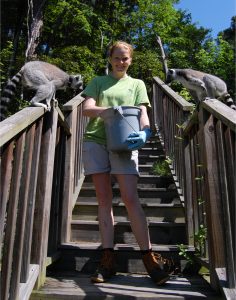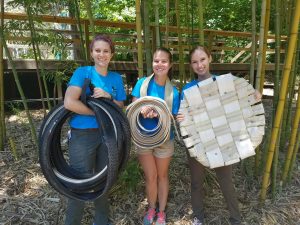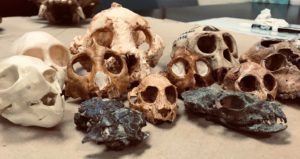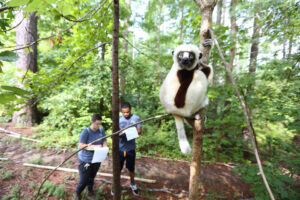Summer Internship Program
We will not host interns in summer 2025. Check back in late 2025 for information about the summer 2026 season.
Internship descriptions
Click on the internship name to view the position description and access the online application link (not currently active).
The Duke Lemur Center is looking for participants for our Summer 2024 Field Research Internship program. The Field Research Internship program serves to introduce students to lemur research and data collection. The internship provides opportunities in research for interested undergraduate students who have no prior research experience and/or do not have a faculty mentor. Interns will be introduced to the fundamentals of behavioral ecology data collection in a field setting and will collect data as part of an on-going study of behavior and forest utilization by the free-ranging lemurs at the Duke Lemur Center, contributing to long-term research goals. Interns will be required to complete an independent project within this larger research scope. Interns can expect to gain experience in research design, ethogram development, individual identification, inter-observer reliability, sampling techniques, data collection, and data entry and analysis, among others. Please note that physical contact with the lemurs is not allowed and will not be tolerated. This program is intended for individuals who are genuinely interested in learning the research process, but who lack prior experience and/or opportunity to otherwise do so. The summer research program requires a 10 week-commitment starting Tuesday, May 28th and ending Saturday, August 3rd, 2024. Weekly schedules can be flexible, but requires 20 hours of on-site training and/or data collection each week, Monday-Friday. Interns will be required to present their project results (oral or poster presentation) as part of a DLC Intern Symposium on Saturday, August 3rd, 2024. REQUIREMENTS: Applicants must be at least 18 years of age. Applicants must either be currently attending college or graduated within the last three years. Applicants must have the ability to understand and follow written and oral instruction, have effective communication skills, and work well both independently and as part of a team. Applicants must possess the ability to adapt to an ever-changing environment. Intern will be observing free-ranging lemurs in the Center's outdoor Natural Habitat Enclosures and will be exposed to many insects such as ticks, chiggers and mosquitoes as well as potential contact with plants that can cause itchy or painful rashes, and possibly, to snakes. DLC staff will train volunteers to minimize exposure to insects, avoid snakes, and identify rash producing plants. This is an unpaid position (with the opportunity to submit supplemental application materials to be considered for one of the few paid internship positions). Housing and transportation are not provided. Interns must have their own transportation to the DLC. Proof of a current negative TB test, documentation of two doses of the measles vaccine (or MMR), and health insurance is required. Note: International students applying for a DLC internship must already have a F-1 Visa through their academic institution in the United States in order to be considered for a position. The following items are required for a complete application: -Current resume -Two letters of recommendation Click here to apply to the Summer 2024 Field Research Internship. Applications are open through March 1st, 2024. The Duke Lemur Center is looking for participants for our Summer 2024 Husbandry Internship program who are interested in gaining animal care experience at a research and conservation center for rare and endangered prosimian primates. Nestled on 100 acres in Duke Forest, the Lemur Center houses over 200 lemurs and bush babies across 13 species—the most diverse population of lemurs on Earth, outside their native Madagascar. Interns will be responsible for assisting in the daily care and maintenance of the Center’s collection of primates. Duties include: -Assisting the Technician staff with the daily care of lemurs -Assisting with the daily cleaning of animal areas, kitchen and service areas -Daily diet preparations -Assisting the Technician staff with daily enrichment and behavioral observations -Assisting the Technician staff with daily enclosure maintenance -Learning from Technician staff about data entry in ZIMS and RedCap -Performing other duties relating to the Center’s goals and mission statement as required The Husbandry Internship requires a 30-hour a week commitment for a ten-week period, starting Tuesday, May 28th and ending Saturday, August 3rd, 2024. The internship schedule will be for five consecutive days each week with one of the days being a weekend day. Interns will be required to present their project results (oral or poster presentation) as part of a DLC Intern Symposium on Saturday, August 3rd, 2024. REQUIREMENTS: Applicants must be at least 18 years of age. Applicants must either be currently attending college or graduated within the last three years. Applicants must have the ability to understand and follow written and oral instruction and have effective communication skills. Applicants must be able to lift 50 pounds. Applicants must possess the ability to adapt to an ever-changing work environment and be available to work weekends and holidays. Public speaking skills are highly encouraged. Interns will be working in the Center’s outdoor Natural Habitat Enclosures and will be exposed to ticks, chiggers and rash producing plants. This is an unpaid position (with the opportunity to submit supplemental application materials to be considered for one of the few paid internship positions). Housing and transportation are not provided. Interns must have their own transportation to the DLC. Proof of a current negative TB test, documentation of two doses of the measles vaccine (or MMR), and health insurance is required. Note: International students applying for a DLC internship must already have a F-1 Visa through their academic institution in the United States in order to be considered for a position. The following items are required for a complete application: -Current resume -Two letters of recommendation Click here to apply to the Summer 2024 Husbandry Internship. Applications are open through March 1st, 2024. The DLC is looking for participants for our Summer 2024 Animal Welfare Internship program. This program will introduce interns to the science of animal welfare and how the science is applied to fulfill the DLC's mission of advancing prosimian husbandry, research and education. Animal Welfare Interns will gain a holistic understanding of the multi-dimensional assessment of welfare and the contributors to optimal welfare including, but not limited to, animal husbandry, medical care, environmental complexity, social structure, enrichment and operant conditioning. The program will include introductory instruction in animal welfare, animal enrichment, lemur behavior, operant conditioning and data collection. Interns will be required to design, complete and present an independent project with a welfare focus. Additionally, interns will create and complete species specific welfare assessments. The Animal Welfare Internship requires a consecutive ten week-commitment starting Tuesday, May 28th and ending Saturday, August 3rd, 2024. The internship requires 20 hours a week. Work hours will be from 9:00 AM to 2:00 PM, Monday – Thursday. Interns will be required to present their project results (oral or poster presentation) as part of a DLC Intern Symposium on Saturday, August 3rd, 2024. REQUIREMENTS: Applicants must be at least 18 years of age. Applicants must have the ability to understand and follow written and oral instruction and have effective communication and interpersonal skills. Applicants must be able to lift 30 pounds. Strong preference will be given to applicants who are majoring in Animal Science, Animal Behavior, Biology, Zoology, or related fields. A portion of the program will be spent collecting fresh browse for the colony. While collecting browse, interns may be exposed to many bothersome creatures, such as ticks, chiggers and mosquitoes. There is also the potential for contact with plants that can cause itchy or painful rashes. Snakes may be encountered. DLC staff will train volunteers to minimize exposure to insects, avoid snakes, and identify rash producing plants. This is an unpaid position (with the opportunity to submit supplemental application materials to be considered for one of the few paid internship positions). Housing and transportation are not provided. Interns must have their own transportation to the DLC. Proof of a current negative TB test, documentation of two doses of the measles vaccine (or MMR), and health insurance is required. Note: International students applying for a DLC internship must already have a F-1 Visa through their academic institution in the United States in order to be considered for a position. The following items are required for a complete application: -Current resume -Two letters of recommendation Click here to apply to the Summer 2024 Animal Welfare Internship. Applications are open through March 1st, 2024. The Duke Lemur Center (DLC) is seeking a highly motivated, team-oriented, and enthusiastic student for our Summer 2024 Education Internship. This internship is a multi-faceted position that introduces interns to all aspects of the education and tour department. This experience is an ideal way for interns to receive a comprehensive view of the inner and outer workings of informal educational programming. Responsibilities will include leading educational tours of the facility to a wide variety of groups with varying age ranges, assisting with special programs, and to a lesser extent, supporting roles such as check-in or gift shop duties. With guidance from the Duke Lemur Center's Education Programs Manager, the education intern will complete an independent project -- the focus of which will be determined collaboratively between interns and the education staff. The Education Internship requires a consecutive ten week-commitment starting Tuesday, May 28th and ending Saturday, August 3rd, 2024. The internship requires 20-30 hours a week. It is strongly preferred that interns be available for either a Sunday - Thursday or a Tuesday - Saturday schedule; however, alternate schedules can be discussed during interviews. REQUIREMENTS: Applicants must be at least 18 years of age. Applicants must have the ability to understand and follow written and oral instruction and have effective communication and interpersonal skills. Applicants must be able to work in summer weather conditions, staying outdoors on paved paths for up to 2 hours continuously. This position does not require walking or standing, but any applicants who use wheelchairs or other mobility aids should note that certain behind-the-scenes learning opportunities that are part of the overall intern experience are not fully accessible, particularly the Natural Habitat Enclosures, due to the nature of working with wild primates. If there are any questions, please do not hesitate to reach out to the Student Programs Coordinator at erin.hecht@duke.edu. The Education internship is a paid position at $15.75/hour. Housing and transportation are not provided. Interns must have their own transportation to the DLC. Proof of health insurance is required. Note: International students applying for a DLC internship must already have a F-1 Visa through their academic institution in the United States in order to be considered for a position. The following items are required for a complete application: -Current resume -Two letters of recommendation Click here to apply to the Summer 2024 Education Internship. Applications are open through March 1st, 2024. The Duke Lemur Center Museum of Natural History (DLCMNH) is looking for aspiring paleontologists to participate in our Summer 2024 Fossil Collection Internship. The Internship is an opportunity to work in an active paleontological research lab that maintains over 30,000 specimens, including the largest collection of primate fossils in North America. The internship provides opportunities for independent research as well as collaborative research in the collection. Interns will be introduced to curatorial methods, fossil preparation and conservation, molding and casting techniques, digital fossil preparation, surface model generation, photogrammetry, and archival research. Interns can also collaborate on exhibit design and fossil-based community outreach. Interns will also have the option to participate in fossil-collecting fieldwork in Wyoming and Utah where they will learn to search for, collect, and document fossil discoveries. The DLCMNH maintains an extensive digital museum on the website MorphoSource, and there are multiple, on-going projects that utilize fossil scans to explore the ecological context of our earliest primate relatives. Interns would be encouraged to develop projects that build and explore these datasets. Interns can also assist in research and identification of fossil material from our extensive subfossil lemur collection from Madagascar, and the generation of digital dissections of microCT scanned comparative specimens. This program is intended for students with a strong interest in the inner-workings of museums, and that have an interest in developing research questions based on biological collections, with a special focus on students that have limited access to biological and fossil collections at their home institutions. Technical skills in fossil and digital preparation are not required, though a comfort learning new skills and software programs is necessary. Interns should be prepared to lift up to 30 pounds and should be aware that some work may require handling noxious chemicals in controlled settings. The summer internship program requires a 10-week commitment starting Tuesday, May 28th and ending Saturday, August 3rd, 2024. Weekly schedules can be flexible. The lab is open 9-5PM Monday-Friday with an expected 20 hours of on-site curation and research. Interns will be required to present their project results (oral or poster presentation) as part of a DLC Intern Symposium on Saturday, August 3rd, 2024. REQUIREMENTS: Applicants must be at least 18 years of age and either be currently attending college or graduated within the last three years. Applicants must have the ability to understand and follow written and oral instruction, have effective communication skills, and have the ability to adapt to an ever-changing work environment. Proof of health insurance is required. This is an unpaid position (with the opportunity to submit supplemental application materials to be considered for one of the few paid internship positions). Housing and transportation are not provided. Interns must have their own transportation to the museum (1013 Broad Street Durham, NC 27705). The following items are required for a complete application: -Current resume -Two letters of recommendation Click here to apply to the Summer 2024 Fossil Collection Internship. Applications are open through March 1st, 2024.


Note: International students applying for a DLC internship must already have a F-1 Visa through their academic institution in the United States in order to be considered for a position.
Application questions
Do you have questions about applying for the DLC summer internship program?
Join us for one of the following optional Zoom application workshops, which are an opportunity for prospective applicants to drop in and ask any questions about the application process or the intern program in general. Click to join anytime during these hour blocks!
If you have general questions regarding internships at the DLC, please check out our Intern FAQs below or contact DLCinternships@duke.edu.
Do you have to be a Duke student to apply to the summer internship program?
You do not have to be a Duke student to apply to DLC internships! When you click on the application link, you will be prompted to either enter your Duke NetID (for current Duke students) or create a Duke OneLink ID as a first time user (for non-Duke students or recent grads). Save this login information so that you can access your application to make edits before submitting and so you can check on your application status throughout the review process.
Internship FAQ
DLC Internship Frequently Asked Questions
Can I apply to multiple DLC internships?
You are welcome to apply to a maximum of two DLC internships. If doing so, you must submit a separate application for each internship department. If you are a finalist for both internships, the intern managers will review your skills and decide which department will extend an offer.
If I am applying to multiple internships at the DLC, do I need to different references/letters of recommendation for each application?
For candidates applying to more than one internship, references may submit the same letters of recommendation for each internship application or can submit different letters of recommendation for an internship if the letter of recommendation highlights strengths and experience for a specific internship.
To whom should my references address my letters?
Applications are reviewed by the intern manager for each department. If you applied to the husbandry internship, the letter should be addressed to the “Husbandry Intern Manager.” If you applied to the field research internship, then “Field Research Intern Manager” would be appropriate, etc..
I see that I am required to obtain certain immunizations if selected for an internship opportunity. Will the DLC pay for this?
No, all immunization costs are up to the intern. Required immunizations are for your safety as well as the safety of the animals. Health insurance and immunization documentation is collected from selected interns after they have accepted an internship offer.
Is housing provided for DLC interns?
No, the DLC internship program does not provide housing or a housing stipend for interns. While you must find your own housing, selected interns will be given access to several housing search resources for the Durham area.
Is transportation provided?
No, selected interns must have their own transportation to get to and from the DLC.
Is this a paid internship program?
A small number of summer ’24 internships will be paid positions. Students in those paid positions will be compensated at a rate of $15.75/hour. It is possible to also receive academic credit for a DLC internship, although some schools may not give course credit for paid positions. Be sure to check with your institution, if you hope to receive academic credit.
Is there an age restriction for interns?
Applicants must be at least 18 years of age. Applicants must either be currently attending college or graduated within the last three years.
Will there be any hands-on contact with the lemurs during the internship?
No. For your safety and the safety of the lemurs, interns are not allowed to have any physical contact with the animals. The lemurs are wild animals and we want them to maintain their natural behaviors.
I am interested in applying to the summer internship program, but can't start on May 27th and/or can't work through August 3rd. Are the internship term dates flexible? Will I be considered for the internship if I am unable to be present for the full extent of the internship?
All summer interns must be available to start on May 27th and work through August 3rd. Interns will present their project at our Summer Intern Project Symposium on August 3rd. Interns must be present every Tuesday from 12-1PM during the internship term for weekly seminars.
How will I know if my application is complete?
You can check the status of your application by logging in to the application management system. You will also receive automated emails throughout the process. If you have additional questions, contact erin.hecht@duke.edu.
How will I hear if I have been selected?
Complete applications will be reviewed starting on March 4th, 2024. Candidates who are selected to receive a phone interview will be notified by March 13th. All candidates who received a phone interview will be notified of the final decision by March 25th, 2024.
I applied for a position but was not accepted. Can I apply again?
Absolutely! If you were not selected for the upcoming internship term, we encourage you to resubmit an application for a future internship term.
Do you still have questions about applying for the summer internship program?
Join us for one of the following optional Zoom application workshops, which are an opportunity for prospective applicants to drop in and ask any questions about the application process or the intern program in general. Click to join anytime during these hour blocks!
Saturday, January 27th from 1-2PM Zoom application workshop
Wednesday, February 7th from 10-11AM Zoom application workshop
NOTE: If you have allergies, please be aware that the DLC keeps peanuts, peanut butter, and tree nuts onsite for lemur food and training rewards. Some internship types, such as Husbandry and Field Research, are more conducive to coming into contact with nuts than other internships types are.
Internship funding
Funding is available for a small number of intern positions, with the purpose of reducing financial barriers to students pursuing experiential learning opportunities in STEM. These paid positions are open only to students who were eligible for need-based financial aid at their institution during the 2024-2025 academic year. Compensation is $16/hour and students in the paid positions must work a minimum of 30 hours per week, with the opportunity to work up to 40 hours.
To be considered for one of the paid positions, please make sure to indicate your intent on the internship application AND submit the following supplemental materials to the application portal, alongside the required application materials.
- Statement of Financial Need: Please write a 200-word statement detailing how a paid position would benefit you financially and make it possible for you to participate in the DLC summer internship program.
- Student Aid Report: Please provide the SAR summary produced after submitting a Free Application for Federal Student Aid (FAFSA) form from the previous academic year. Click here for more information about the Student Aid Report.
Paid internship position offers will go out at the same time that offers are made for the unpaid internship positions. If you apply for a paid position but are not selected, you will still be considered for an unpaid position in the same department.
It is also possible to receive academic credit for the internship, although some schools may not give course credit for paid positions. Be sure to check with your institution if you plan to apply for one of the paid positions and also hope to get course credit.
Help support our interns!
Did you know that until 2022, the Duke Lemur Center only offered UNPAID undergraduate internships? Summer ’22 was the first year we were able offer some funded intern positions, thanks to support received from donors willing to provide $8,000 to cover one intern’s hourly compensation for the 10-week program. Since introducing paid internship positions, we have received more applications than ever before, making the applicant pool more competitive and including applicants from a broader range of backgrounds. Our goal for the future is for all internship positions to be funded. If you or your organization would like to fund a summer intern, contact our Development Officer, Mary Paisley, at mary.paisley@duke.edu!




